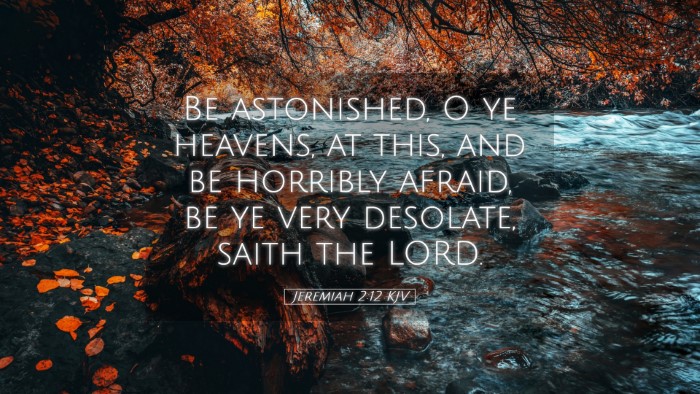Commentary on Jeremiah 2:12
Verse: "Be astonished, O ye heavens, at this, and be horribly afraid; be ye very desolate, saith the Lord."
In this verse, God calls upon the heavens to witness the astonishing spiritual unfaithfulness of His people. This call indicates a gravity that is meant to invoke a deeper sense of horror and accountability.
Contextual Background
In the broader context of Jeremiah, the prophet is addressing the nation of Judah during a critical time of spiritual decline. The people had strayed away from the covenant they had with God, looking instead to idols and foreign gods. This verse acts as a stark warning and a call to repentance.
Insights from Public Domain Commentaries
Matthew Henry's Commentary
Divine Astonishment: Matthew Henry emphasizes the astonishment that God expresses in His call to the heavens. He suggests that the heavens, created for God’s glory, have a profound sense of the weight of humanity's recklessness. Henry notes that the creation itself should be horrified by the sins of men, underscoring how sin is not merely a human issue but one that disturbs the divine order of things.
Reflection on Fear: He suggests that the command to be "horribly afraid" reflects the severity of the offense against God. He indicates that such a fear is rightfully placed, for God’s displeasure is upon those who forsake Him for idols. Henry points out that this is not just a fear of consequences but of the spiritual death that accompanies forsaking God.
Albert Barnes' Commentary
Testimony of the Heavens: Barnes highlights the uniqueness of the statement where the heavens are called upon to witness the sins of the people. It indicates that the heavens are not indifferent to human actions but are keen observers of the moral state of humanity. The heavens, being God's creation, are witnesses to the covenant relationship and the transgressions of the people.
Betrayal of Covenant: Barnes stresses that God’s astonishment is rooted in the betrayal of His covenant. He explains that despite its richness and beauty, the people have turned to emptiness. Barnes encourages the reader to understand this verse as a powerful reminder of the need for fidelity to God, warning against the spiritual emptiness that idolatry brings.
Adam Clarke's Commentary
Solemn Exclamation: Clarke observes that the phrase “be astonished” serves as a divine exclamation. He explains that God is expressing a divine lament over His people’s choices. This reflects a deep emotional response from God to human waywardness.
Desolation and its Implications: Clarke further explains the term "desolate" as indicative of the spiritual ruin that follows after turning away from God. He warns that such desolation is a natural consequence of abandoning true worship. Clarke encourages believers to adhere closely to God’s statutes to avoid such spiritual decay.
Theological Implications
The implications of Jeremiah 2:12 extend beyond its historical context. There are important theological reflections that can be made which remain relevant today:
- God's Jealousy: This verse reflects God's desire for His people. His astonishment is a testament to His love and commitment, which should lead to a response of faithfulness from those He loves.
- Covenantal Faithfulness: The need for fidelity to God's covenant is paramount. Just as Israel was called to faithfulness, contemporary believers are reminded of the consequences of spiritual adultery.
- Universal Witness: The verses remind readers that the entire created order bears witness to human actions. This insight encourages a holistic view of human sinfulness that impacts divine creation.
- Call to Reflection: The call to astonishment serves as an invitation for self-reflection in the lives of believers today, prompting introspection about where they may have strayed.
Conclusion
Jeremiah 2:12 stands as a poignant reminder of the seriousness of turning away from God. The combined insights from the public domain commentaries reveal a layered understanding of the gravity of sin, the divine reaction to human infidelity, and the call to accountability both personally and corporately. For pastors, theologians, and scholars, this verse opens up discussions about God’s nature, the implications of covenantal relationships, and the role of creation in witnessing humanity's relationship with the Divine.


